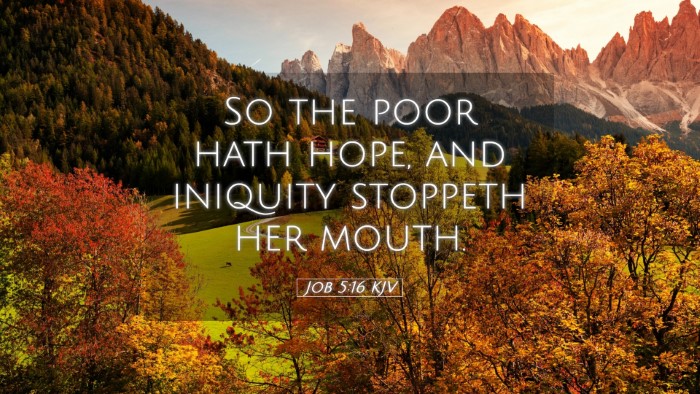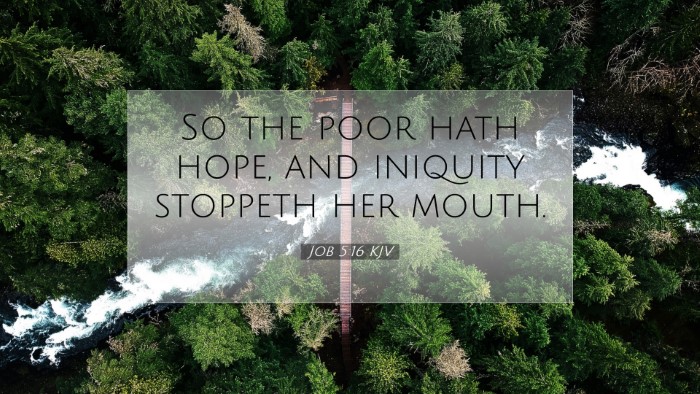Old Testament
Genesis Exodus Leviticus Numbers Deuteronomy Joshua Judges Ruth 1 Samuel 2 Samuel 1 Kings 2 Kings 1 Chronicles 2 Chronicles Ezra Nehemiah Esther Job Psalms Proverbs Ecclesiastes Song of Solomon Isaiah Jeremiah Lamentations Ezekiel Daniel Hosea Joel Amos Obadiah Jonah Micah Nahum Habakkuk Zephaniah Haggai Zechariah MalachiJob 5:16
Job 5:16 KJV
So the poor hath hope, and iniquity stoppeth her mouth.
Job 5:16 Bible Commentary
Commentary on Job 5:16
Job 5:16 states: “So the poor have hope, and iniquity stoppeth her mouth.” This verse encapsulates the profound themes of hope, divine justice, and the human condition central to the book of Job. Below is a synthesis of insights from several public domain commentaries.
Overview of Job 5
The fifth chapter of Job marks a significant shift in the dialogue between Job and his friends, especially through the voice of Eliphaz. The overarching message of this chapter is an assertion of God’s justice and the expectation of His intervention in human affairs. The rich theological underpinnings here are vital for understanding why Eliphaz ascribes what he perceives as divine wisdom to his counsel.
Contextual Analysis
The context of the verse arises from Job’s ongoing suffering and the philosophical musings of Eliphaz, who is trying to rationalize the suffering of the innocent. Eliphaz takes the stance that although Job has suffered significantly, there is a divine order and purpose behind it.
Hope for the Poor
The phrase “the poor have hope” aligns with the biblical theme of God’s concern for the marginalized. As noted by Matthew Henry, it signifies that while the wealthy might rely on their resources and status, the poor tend to turn toward God, fostering a relationship of dependence and faith. This hope is an essential aspect of the human experience, especially in times of duress.
Iniquity Stoppeth Her Mouth
In connecting “iniquity” with the cessation of its voice, Albert Barnes emphasizes that sin and wrongdoing ultimately lead to silence. This can be interpreted in various ways: the silence of judgment, the inability to defend oneself before God, or a complete moral bankruptcy. Thus, there is a reassurance that evil does not prevail ultimately; its voice will be silenced by divine intervention.
Theological Implications
This verse poses significant theological questions about justice, equity, and the nature of hope that resonate through both the Old and New Testaments. The significance of hope is profound, implying that regardless of temporal suffering, there is an ultimate divine purpose and restoration promised by God.
God's Concern for the Suffering
Adam Clarke aligns God’s character with compassion and justice towards those who suffer, affirming that the afflictions of the righteous are noted and tended to by God. The verse serves as a reminder to believers that divine justice ultimately favors the humble and oppressed.
- Humility and Dependence: The poor’s hope can be aligned with a posture of humility, leading to dependence upon God’s grace.
- Divine Justice: The silencing of iniquity serves as a reiteration of God’s divine justice, assuring that truth and righteousness will prevail.
- Encouragement for Believers: This verse serves as an encouragement for those who find themselves in the depths of despair, reminding them of the hope that exists within the framework of God’s providence.
Practical Applications
For pastors and theologians, this verse offers rich material for preaching and teaching. It encourages reflection on the nature of hope and justice in relation to human suffering. It provides a pastoral framework to address congregational concerns regarding injustice, suffering, and the silent cries of the oppressed.
Building Resilience in Ministry
Understanding Job 5:16 can help ministers provide counsel to those in distress. By affirming that hope persists even in dire circumstances, they can guide individuals toward recognizing God’s presence and action, even when it feels absent. This verse fosters resilience in faith communities, reinforcing that God hears and responds to the plight of the marginalized.
The Role of the Church
This text calls for the church to stand in solidarity with the poor and oppressed. By embodying the hope that Job references, congregants can work towards creating a more just society where iniquity is indeed silenced.
Concluding Thoughts
Job 5:16 ultimately provides a profound commentary on the dual realities of hope and justice. Through the lens of biblical commentary, we see that the verse invites believers to embrace a hopeful disposition in the face of trials, reassured that iniquity shall not have the final word. This powerful truth can be a source of strength for all who grapple with life's hardships.


